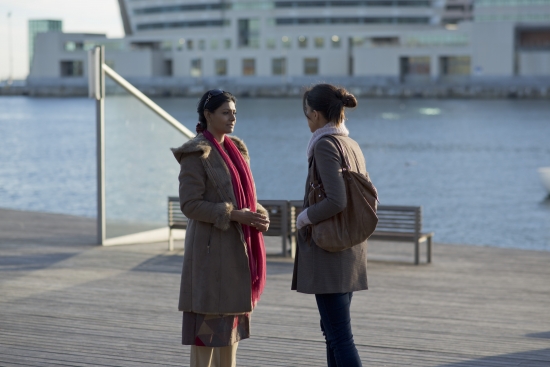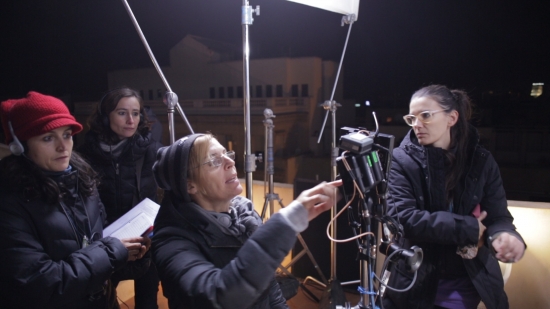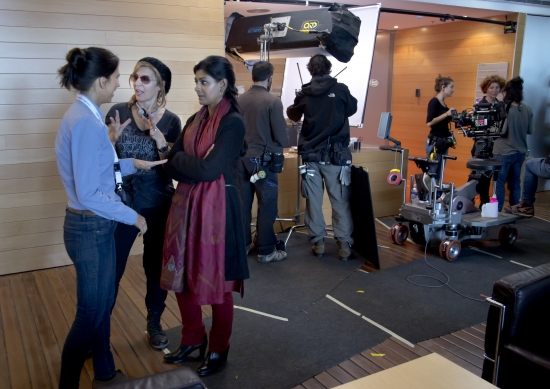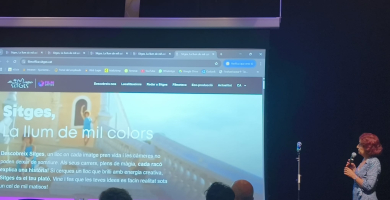
We interviwed Aina Clotet!
This month we interview Aina Clotet, the protagonist of the last film directed by Maria Ripoll, Traces of Sandalwood, shot at the beginning of this year between Barcelona and Mumbai.

This consolidated young Catalan actress, who has worked in several projects both in film, television and also theatre, is currently also a chair member of the Catalan Film Academy. She has dedicated us a few minutes to talk about her work, and also about Barcelona, her hometown where she has never stopped working.
You have been acting since you were 12 years old. That means a lot of shoot! What is the most surprising and spectacular work you have done in Barcelona?
It is always difficult to choose, because each project belongs to a different personal stage, but I love the way that Traces of Sandalwood shows Barcelona. My character, Paula, suddenly rediscovers the city and she realizes that close to her there are neighbourhoods and cultures that she didn’t know before.
Traces of Sandalwood was shot between Mumbai and Barcelona. What are the pros and cons of working in such different cities? Do you think these cities are complementary of each other?
I think all are pros! It was a great experience to shoot in Mumbai, discovering its people, its smells, and its colours. They have a great cinematographic experience and it was wonderful to roll with them. I think we have learned a lot about each other. After a few days dealing with the heat and the Indian chaos, we went to shot to Barcelona and it was winter, so it was a great contrast. Suddenly the streets seemed empty! I think these large differences enrich the story. Traces of Sandalwood, was a great journey for all the crew, and will also be a great one for all the viewers who enjoy the film. This story builds bridges between two cities, which is the most important.
Traces of sandalwood has been very well received at festivals and markets from all over the world, such as the Toronto International Film Festival, the Montreal World Film Festival, the Indian Film Festival The Hague, the Seminci of Valladolid or the Most Festival. In your opinion, what is the element that makes this film so lovable?
This film is an emotional story. It talks about it of universal feelings such as the research for identity, fraternal love, and love in general, that gives the strength to overcome difficulties. But I want to headline the sense of humour too, people laugh with the film. And for me, this is very important. In the most dramatic situations of life humour appears, and I think this really helps people to feel identified and connected with the movie. It’s a feel-good-movie, and nowadays, the audience appreciates it!
You are chair of the Catalan Film Academy. What does this position mean? How do you assess the role played by the Academy towards the industry? What is the most and least thing you like of your role?
It’s an honour to be part of the Academy’s board, and I’m very grateful to Isona Passola to propose me. We are a balanced team, and together we try to provide ideas to attract more members, more money, more financial funds, more industry... but mostly, I want to highlight the work done by Montse Majench, Academy director, and Isona Passola, the president, who never stop putting their hearts and souls in it. I must say that we all usually agree with the decisions we take. It’s a great board!
What I like least is not going to the meetings while I’m working. I don’t like missing them.
We know you have some projects in the US, especially in Los Angeles. What can you tell us about that? And about the experience working on the Mecca of cinema?
I have managers in Los Angeles and sometimes I take part in castings. I’m waiting to take a break from work to go there again. I have also started a project that is in a development stage, and I hope to roll it soon.
The experience of living for a while in LA has been fantastic! We can learn a lot from the American industry. They team up so much and they always listen to young professionals and new proposals. There is a lot of competition, but also a lot of opportunities.













